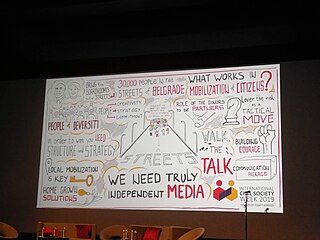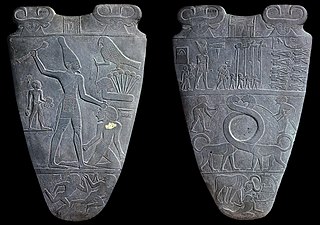State capitalism is an economic system in which the state undertakes business and commercial economic activity and where the means of production are nationalized as state-owned enterprises. The definition can also include the state dominance of corporatized government agencies or of public companies such as publicly listed corporations in which the state has controlling shares.

In the fields of sociology and political science, authority is the legitimate power of a person or group over other people. In a civil state, authority is practiced in ways such a judicial branch or an executive branch of government.

A warlord is a person who exercises military, economic, and political control over a region in a country without a strong national government; largely because of coercive control over the armed forces. Warlords have existed throughout much of history, albeit in a variety of different capacities within the political, economic, and social structure of states or ungoverned territories. The term is most often applied to China in the mid-19th century and the early 20th century. The term can also be used for any supreme military leader.

Civil society can be understood as the "third sector" of society, distinct from government and business, and including the family and the private sphere. By other authors, civil society is used in the sense of 1) the aggregate of non-governmental organizations and institutions that advance the interests and will of citizens or 2) individuals and organizations in a society which are independent of the government.
In political science, a political system means the type of political organization that can be recognized, observed or otherwise declared by a state.

A bureaucrat is a member of a bureaucracy and can compose the administration of any organization of any size, although the term usually connotes someone within an institution of government.

Democratization, or democratisation, is the transition to a more democratic political regime, including substantive political changes moving in a democratic direction. It may be a hybrid regime in transition from an authoritarian regime to a full democracy, a transition from an authoritarian political system to a semi-democracy or transition from a semi-authoritarian political system to a democratic political system.
A hydraulic empire, also known as a hydraulic despotism, hydraulic society, hydraulic civilization, or water monopoly empire, is a social or government structure which maintains power and control through exclusive control over access to water. It arises through the need for flood control and irrigation, which requires central coordination and a specialized bureaucracy.
Rational-legal authority is a form of leadership in which the authority of an organization or a ruling regime is largely tied to legal rationality, legal legitimacy and bureaucracy. The majority of the modern states of the twentieth and twenty-first centuries are rational-legal authorities, according to those who use this form of classification.

The Japanese civil service employs over three million employees, with the Japan Self-Defense Forces, with 247,000 personnel, being the biggest branch. In the post-war period, this figure has been even higher, but the privatization of a large number of public corporations since the 1980s, including NTT, Japanese National Railways, and Japan Post, already reduced the number.

State-building as a specific term in social sciences and humanities, refers to political and historical processes of creation, institutional consolidation, stabilization and sustainable development of states, from the earliest emergence of statehood up to the modern times. Within historical and political sciences, there are several theoretical approaches to complex questions related to role of various contributing factors in state-building processes.
Neopatrimonialism is a system of social hierarchy where patrons use state resources to secure the loyalty of clients in the general population. It is an informal patron–client relationship that can reach from very high up in state structures down to individuals in small villages.

Liberal democracy is the combination of a liberal political ideology that operates under a representative democratic form of government. It is characterized by elections between multiple distinct political parties, a separation of powers into different branches of government, the rule of law in everyday life as part of an open society, a market economy with private property, and the equal protection of human rights, civil rights, civil liberties and political freedoms for all people. To define the system in practice, liberal democracies often draw upon a constitution, either codified or uncodified, to delineate the powers of government and enshrine the social contract. After a period of expansion in the second half of the 20th century, liberal democracy became a prevalent political system in the world.
The term bureaucracy refers to a body of non-elected governing officials as well as to an administrative policy-making group. Historically, a bureaucracy was a government administration managed by departments staffed with non-elected officials. Today, bureaucracy is the administrative system governing any large institution, whether publicly owned or privately owned. The public administration in many jurisdictions and sub-jurisdictions exemplifies bureaucracy, but so does any centralized hierarchical structure of an institution, e.g. hospitals, academic entities, business firms, professional societies, social clubs, etc.
Authoritarianism is a political system characterized by the rejection of political plurality, the use of strong central power to preserve the political status quo, and reductions in the rule of law, separation of powers, and democratic voting. Political scientists have created many typologies describing variations of authoritarian forms of government. Authoritarian regimes may be either autocratic or oligarchic and may be based upon the rule of a party or the military. States that have a blurred boundary between democracy and authoritarianism have some times been characterized as "hybrid democracies", "hybrid regimes" or "competitive authoritarian" states.
Political class, or political elite is a concept in comparative political science, originally developed by Italian political theorist Gaetano Mosca (1858–1941). It refers to the relatively small group of activists that is highly aware and active in politics, and from whom the national leadership is largely drawn. As Max Weber noted, they not only live "for politics"—like the old notables used to—but make their careers "off politics" as policy specialists and experts on specific fields of public administration. Mosca approached the study of the political class by examining the mechanisms of reproduction and renewal of the ruling class; the characteristics of politicians; and the different forms of organisation developed in their wielding of power.
Authoritarian socialism, or socialism from above, is an economic and political system supporting some form of socialist economics while rejecting political liberalism. As a term, it represents a set of economic-political systems describing themselves as socialist and rejecting the liberal-democratic concepts of multi-party politics, freedom of assembly, habeas corpus and freedom of expression, either due to fear of the counter-revolution or as a means to socialist ends. Several countries, most notably the Soviet Union, China and their allies, have been described by journalists and scholars as authoritarian socialist states.
A socialist state, socialist republic, or socialist country, sometimes referred to as a workers' state or workers' republic, is a sovereign state constitutionally dedicated to the establishment of socialism. The term communist state is often used synonymously in the West specifically when referring to one-party socialist states governed by Marxist–Leninist communist parties, despite these countries being officially socialist states in the process of building socialism and progressing toward a communist society. These countries never describe themselves as communist nor as having implemented a communist society. Additionally, a number of countries that are multi-party capitalist states make references to socialism in their constitutions, in most cases alluding to the building of a socialist society, naming socialism, claiming to be a socialist state, or including the term people's republic or socialist republic in their country's full name, although this does not necessarily reflect the structure and development paths of these countries' political and economic systems. Currently, these countries include Algeria, Bangladesh, Guyana, India, Nepal, Nicaragua, Sri Lanka and Tanzania.
Following the Arab Spring, the military tightened its control of the Egyptian economy. Details of the military's role in the economy are unclear given that statistics regarding the economy are absent or known to be wildly inaccurate.
Authoritarian capitalism, or illiberal capitalism, is an economic system in which a capitalist market economy exists alongside an authoritarian government. Related to and overlapping with state capitalism, a system in which the state undertakes commercial activity, authoritarian capitalism combines private property and the functioning of market forces with repression of dissent, restrictions on freedom of speech and either a lack of elections or an electoral system with a single dominant political party.







